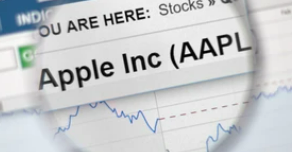
Charlie Brooks
Apr 29, 2022 09:52

Shares fell 2.2 percent in late trading following a conference call in which executives lay out their bleak prognosis. The news eclipsed Apple's (NASDAQ:AAPL) fiscal second-quarter earnings and sales records, which ended in March.
Luca Maestri, Apple's Chief Financial Officer, cautioned in an interview that the crisis in Ukraine, which forced Apple to suspend sales in Russia, will have a greater impact on sales in the fiscal third quarter.
He warned analysts on the call that supply-chain issues will reduce sales by $4 billion to $8 billion in the third quarter, a figure "much greater" than the hit in the second quarter.
Supply issues were concentrated along a corridor in Shanghai, China, he added, and were a result of COVID disruptions and chip shortages. He added that the pandemic was also harming demand in China.
Tim Cook, Apple's CEO, stated that nearly all of the Chinese plants responsible for final assembly of Apple goods have resumed operations following recent COVID shutdowns, but the company is not estimating when the chips shortage, which is primarily affecting older devices, would end.
Cook expressed hope that COVID-related concerns would be "transitory" and "improve with time."
At least one expert expressed concern about the lack of clarity in the prognosis.
"We were all waiting for greater indication on what is really going on over there (in China)," said Louis Navellier, chief investment officer of Navellier & Associates.
Kim Caughey Forrest, Chief Investment Officer at Bokeh Capital Partners, stated that despite Apple's supply chain management in the March quarter, continuous demand remained a major concern.
Indeed, other prominent IT businesses have expressed similar reservations. Amazon (NASDAQ:AMZN) reported a poor outlook on Thursday as it was swamped by increasing costs, sending its shares down 9% after the close, while Intel Corp (NASDAQ:INTC) anticipated a bleak quarter due to supply chain concerns, sending its stock down 4%.
Both businesses, along with Apple, are components of the broader Nasdaq index, which has lost almost 19 percent this year as investors flee from increasing inflation.
According to Refinitiv statistics, Apple's overall fiscal second-quarter sales was $97.3 billion, up 8.6 percent year over year and exceeding analysts' average forecast of $93.89 billion.
Worldwide phone sales revenue was $50.6 billion, up 5.5 percent year over year, while services revenue increased 17 percent to $19.8 billion, both of which exceeded analyst consensus estimates.
Maestri stated, however, that services growth will moderate from the March quarter, but would stay in the double digits. He highlighted a number of concerns, including deteriorating foreign exchange rates.
Profits totaled $25 billion, or $1.52 per share, substantially exceeding analysts' estimates of $23.2 billion and $1.43 per share.
Apple also increased its dividend by 5% to $0.23 per share and authorized a $90 billion share buyback.
Investors have been bracing for a decline in consumer spending on technology gadgets and services as the Ukraine crisis and other reasons drive up the price of gasoline, food, and other basic commodities.
Cook waved off a query from an analyst on inflation and consumers.
"We're keeping a careful eye on that. However, our primary concentration at the moment, really, is on the supply side "'He stated.
When asked about rising inflation, Maestri stated that demand, notably for iPhones, had exceeded expectations at the start of the quarter. However, he highlighted that inflation was having an effect on expenses.
Other businesses have profited from the pandemic, notably the shift to hybrid work.
Apple reported that iPad sales decreased 2% to $7.65 billion owing to supply-chain restrictions, while income from Mac computers increased 14.7 percent to $10.4 billion.
Wearables, home speakers, and accessories sales increased 13% to $8.8 billion, but were the only segment to fall short of Wall Street estimates. Maestri stated that the Watch and AirPods were well-received, and ascribed the shortfall to seasonal fluctuations in demand for other accessories.
Apple reported that it now has 825 million paying customers across its at least seven subscription products, up 40 million over the previous quarter's 785 million. Its expansion comes as competitors such as Netflix Inc (NASDAQ:NFLX) report declining user counts.

Apr 29, 2022 09:51

Apr 29, 2022 09:53